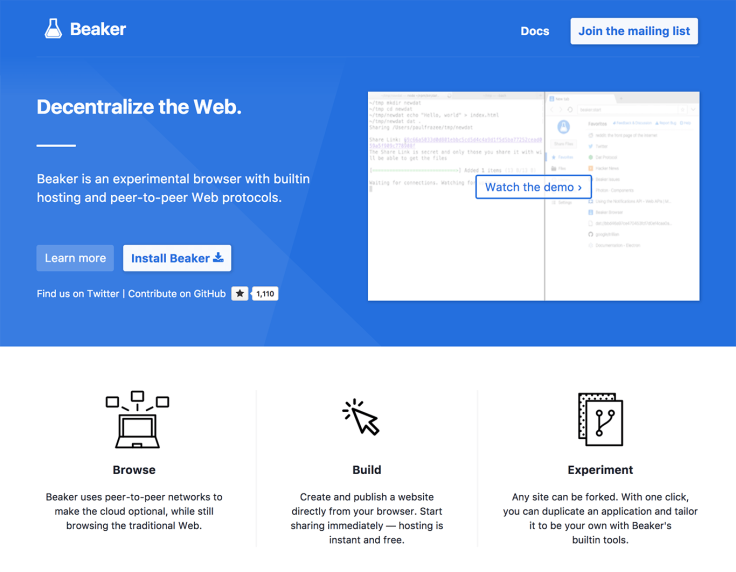Blockchain not required: Beaker Browser's Paul Frazee on building the decentralsed web
'The original vision of the web was that anybody could create and own their website. It was creative and diverse. Now, all that power to create is on other people's servers.'

The past couple of years have seen a huge rush of excitement for decentralisation technologies, driven by the growing hype around Bitcoin and its underlying blockchain ledger system.
Despite all the noise about crypto-tokens and their endless use cases, a viable future decentralised web architecture may only use blockchain for a small set of uses like payments and domain names – nobody really knows.
On the non-blockchain decentralisation side, a particularly promising technology is Beaker Browser, which uses a protocol called Dat, a web of commons created by global communities in an open and secure manner.
Paul Frazee, founder of Beaker Browser, uses the term "peer-to-peer web" which he defines as "an experimental technology that runs websites and applications on people's computers instead of relying on servers. The goal of that technology is to give people control over the web instead of relying on large businesses to run their services."
Beaker Browser doesn't rely on servers; it keeps data stored on personal devices and it lets users modify their applications directly. "The source code is available to them and they can just work with it. So it's a very open source, very open application stack," added Frazee.
The Dat technology was an adaptation of BitTorrent, to which a bunch of new capabilities were added. "Sometimes we think of it as sort of like BitTorrent 2.0," he said, "but it's more of a spiritual descendant than it is actual technological descendant."
Some of these important changes include the ability of data to change over time; and to add versioning to the technology as well, so it's possible to refer to old versions of information.
"These were actually pretty important to making the technology fit into the context of the web. Some of the changes made it possible to have nice simple URLs and to work as dynamic websites that can change over time. Sometime I tell people, if we really wanted to, we could probably go back to BitTorrent itself and retrofit it to make it fit into our use case. But Dat added some nice new capabilities so that's what we went with."
And has there been a surge in interest to the space in line with the blockchain hype cycle?
"Without a doubt," says Frazee, who describes himself as an "Unblockchain consultant".
"I think that this comes from the fact the internet has always been about disintermediating, getting rid of middlemen and empowering individuals and communities. So I think what we are seeing is a kind of continuation of that process.
"The web started to have a lot of big winners and big businesses begin to run it, and I think people are now looking to control that original dream of not relying on large businesses."
Asked what he thinks is most broken about the internet today, Frazee said: "The original vision of the web was that anybody could create and own their website. It was creative and diverse. Now, all that power to create is on other people's servers."
"So we want to try to invert that relationship – to one where the source code and the data live on people's own computers. Then folks can just transact with each other directly, as opposed to having to go through these third parties.
"In a way it's sort of like how Linux was the first operating system to be open sourced, compared to all these proprietary operating systems before it. We are trying to do a similar thing but up against the big players like Facebook and Twitter and things like that."

Having a cryto-token built in can be used to motivate users to behave in economically incentivised ways. And of course there's a lot of money on the table that ICO merchants are scrabbling for the opportunity passes.
On the subject of tokens Frazee said: "I think it's an extraordinarily neat idea, with some potential. We found it's not necessary and the technology to support it is just more overhead than is needed to accomplish what we are doing.
"We feel it wouldn't serve the product – it would be nice to get that money but we'll find it somewhere else."






















